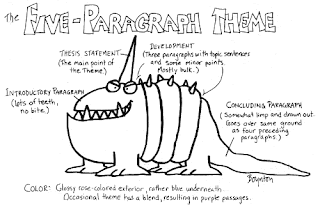 |
| Good writing is hard work |
As I wrote the two
formal papers, they were, obviously, more formal.
I knew that a well-written paper included an organization and structure of
thoughts that helped the reader understand the argument, a variety of sentence
structure, and clear, simple language. I knew what constituted a formal paper,
and I stuck to those guidelines. Yet, while I do have a voice when writing
these essays, it is a more rigid, more academic one. This
same structured, formal voice and style of writing also applies to the more
prescribed blog posts that were more academically focused, like in my post ‘For Orwell, Swan, and Gopen, less is more’.
But when I wrote on
more open, ‘free’ topics, the posts tended to vary quite a bit in structure and
I experimented more with the way I organized my thoughts. In posts like, ‘A Eulogy,’ the way each idea had a separate sentence, and some were grouped like
stanzas gave the post a more poetic tone. And In my post ‘Quite possibly the best cup of coffee’, I decided to structure my thoughts more linearly and
progressively, so that the post was more of a narrative.
 |
| Here's a pic I snapped of me writing my blog posts |
This blog
introduced also me to writing about more ‘academic’ topics, but in a less
serious way. While I am still beginning
to lessen the distinction between my writing about more formal topics and more
personal topics, I was able to at least start to establish my voice, one that
communicates to a community of people, not just a professor. Through this blog
I realized that there are topics that you would write about in a formal paper that
you can write in a blog post, topics that are perhaps made more interesting
through humor, opinion, sarcasm, and relating it to current events in the world
and your own life.
However, that’s
not to say I think we should disregard the formal paper. I don’t agree with the
professor discussed in the article who wants to abandon the essay altogether. The
formal paper is important because it teaches us how to communicate, to get an
idea across by clearly establishing an argument, the structure of the essay,
and the evidence. All of this is necessary to then move on to the less formal
structure of a blog.
It’s sort of like
back in ninth grade when we learned how to write a five-paragraph essay: the
link, the lead, the thesis, the three main ideas, the quote integration, and
the conclusion that restates the thesis. Thinking back to it, all of this
structure seems a bit repressive. Why would they even teach us to write with
such a lack of creativity?
 |
| Oh, the five paragraph essay |
However, this initial structure was necessary so
that when we began developing our own theses and paragraph structures in
eleventh and twelfth grade, we would have a strong foundation to base it on. Essentially, in order to break the rules, we
need to know them first. The same thing is happening here with formal writing
and the blog post. The organizational and expressive skills we learn though the
formal paper give us the skills necessary to then take those same ideas and
write them with more personal voice and opinion within the blog.
 |
| This is what our writing would look like without the structure we learned early on |
Both the academic
paper and blog are valuable. However, sometimes the informality of the blog can
cause us to diminish the value of what we write; because there is no formality
is there, we might think less of it, and therefore not execute the best work or
take the subject as seriously. Appreciating formality is a form of respect, in
a way, and should not be completely disregarded. And, while I’m still trying to
find this balance within my own writing, merging the formal with the personal
into a blog, this project has made me realize this balance, and the importance
of both formal and less formal ways of writing.
Aretha Franklin appreciating the formality of the essay:
Aretha Franklin appreciating the formality of the essay:
No comments:
Post a Comment